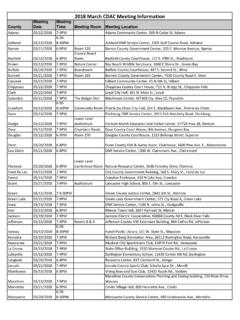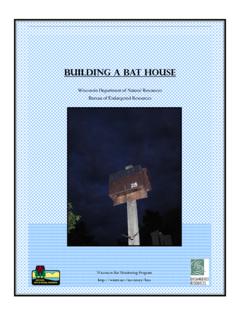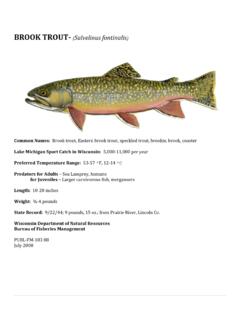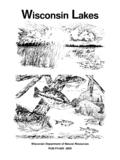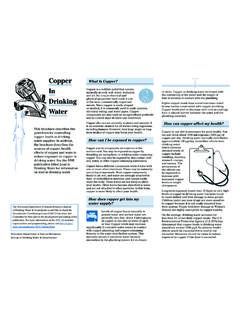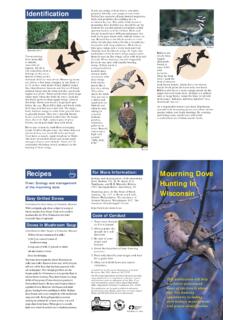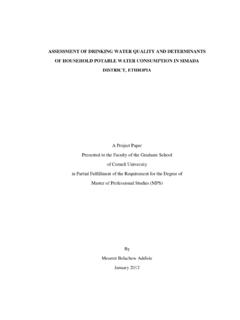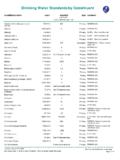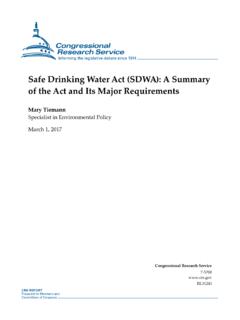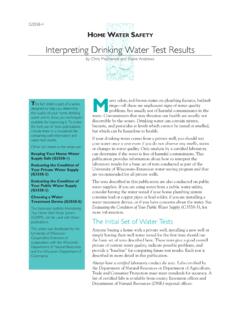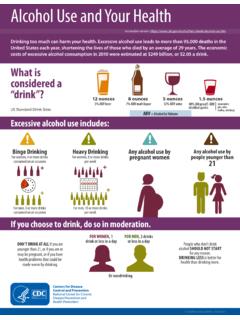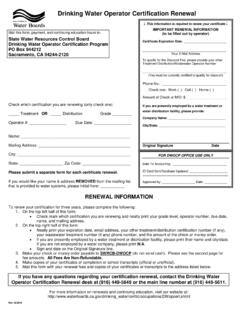Transcription of What are the health risks of consuming Nitrate In Drinking ...
1 How does Nitrate enter groundwater?In nature, water usually contains less than 1 milligram of Nitrate -nitrogen per liter and is not considered a health concern. Significantly higher Nitrate concentrations can indicate that the Drinking water has been contaminated and may pose a serious health concern. Common sources of Nitrate include nitrogen fertilizers, manure, septic systems and sewage treatment practices. Nitrate dissolves easily in water and does not adsorb onto the soil. It can easily be carried into the groundwater by rainwater and melting snow as they percolate through the soil and bedrock into the underlying my well at risk? The only way to know if your Drinking water contains excessive Nitrate is to have a water sample analyzed by a certified laboratory. There are also several things you can check to determine your well s vulnerability to Nitrate contamination. Well Location. Nitrate -contaminated wells are often located near farm fields, barnyards, feedlots, septic tanks, municipal wastewater treatment systems or sludge spreading sites.
2 Well casing depth and construction. Since Nitrate enters the aquifer from the ground surface, wells that have shallow casing are more likely to be affected than deeper cased wells. Geology. Areas with highly porous, sandy soils, fractured bedrock, natural caves and sinkholes, and shallow depths to groundwater are especially vulnerable to contamination. Areas with highly exposed creviced bedrock or specific geologic conditions known as karst limestone geology, present in much of Door County for example, may also be vulnerable to Nitrate are the health risks of consuming water with high concentrations of Nitrate ? Nitrate levels greater than 10 ppm exceed state and federal standards for Nitrate in public Drinking water supplies. No infant or any female who is or may become pregnant should consume any water that exceeds this standard (either by Drinking or by eating foods prepared with the water such as soups, juices, and coffee).
3 Additionally, the Wisconsin Department of health Services recommends that all people avoid long-term consumption of water that has a Nitrate level greater than 10 infants under 6 months of age ingestion of Nitrate can reduce the blood s ability to carry oxygen. In severe cases it can cause a condition that doctors call methemoglobinemia. The condition is also called blue baby syndrome because the infant s skin appears blue-gray or lavender in color. This skin color change is caused by a lack of oxygen in the blood. All infants less than 6 months of age are at risk of Nitrate toxicity, but premature babies and babies with other health problems are more sensitive than healthy infants. An infant suffering from blue baby syndrome needs immediate medical care because the condition can lead to coma and death if it is not treated nursing mothers ingest water containing elevated concentrations of Nitrate , the amount of Nitrate in breast milk may increase slightly.
4 Although no confirmed cases of blue baby syndrome have been associated with Nitrate in breast milk, it may be advisable for nursing women to avoid Drinking water that contains more than 10 milligrams of Nitrate per liter of scientific studies have also found evidence of an association between exposure to high Nitrate levels in Drinking water during the first weeks of pregnancy and certain birth defects; further scientific study is needed to confirm this researchers suspect that consuming Nitrate -contaminated water may increase the risk of thyroid disease, diabetes, and certain types of cancer. People who have heart or lung disease, certain inherited enzyme defects or cancer may be more sensitive to the toxic effects of Nitrate than healthy individuals. Wells contaminated with high Nitrate levels are more likely to be contaminated with agricultural pesticides. If your water is contaminated with Nitrate , you may want to have the water tested for pesticides, especially if your well is near farm Wisconsin Department of Natural Resources Bureau of Drinking Water and Groundwater would like to thank the Groundwater Coordinating Council (GCC) Education Sub-Committee for its part in the development and editing of this publication.
5 For more information on the GCC, it s member organizations and programming, please visit Choose Government, State Agencies, followed by List of Agencies then select Groundwater Coordinating Council. Wisconsin Department of Natural Resources Bureau of Drinking Water & GroundwaterThis brochure explains how Nitrate can enter Drinking water supplies, the health effects of Nitrate exposure, when to test a private well, and things you can do to reduce the Nitrate level in your Drinking water. The brochure also provides sources of information and assistance that may be useful to private well is Nitrate ? Nitrate (NO3 ) is a compound made up of nitrogen and oxygen. It is formed when nitrogen from ammonia or other sources combines with oxygen in water. Nitrate is naturally found in plants and in vegetables at varying concentrations. It is often in groundwater depending on the amount of fertilizer and manure applied to crop fields.
6 According to the Environmental Protection Agency, most adults who are eating a balanced diet may consume 10-25 milligrams of Nitrate -nitrogen per day in their food. Most of this Nitrate comes from leafy vegetables like lettuce, cabbage, celery, spinach, and cured meats. Additional exposure to Nitrate from contaminated Drinking water may pose a significant health Wisconsin Department of Natural Resources provides equal opportunity in its employment, programs, services and functions under an Affirmative Action Plan. If you have any questions, please write to: Equal Opportunity Office, Department of the Interior, Washington, 20240. This publication is available in alternative format (large print, Braille, audiotape, etc.) upon request. Please call (608) 266-1054 for more do I know if my water is safe to drink?Public Water SystemsAll public water systems are required to notify consumers if any regulated contaminant, including Nitrate , exceeds the maximum contaminant level (MCL) that is set by the federal Safe Drinking Water Act.
7 Municipal systems (such as city, town, or sanitary districts) and Other-Than-Municipal (OTM) systems (such as mobile home parks or condominium associations) are required to report any detection of a regulated contaminant that occurred in the previous year in their annual Consumer Confidence Report (CCR). If you would like to view your community s CCR, contact your local water supplier or visit the Wisconsin Department of Natural Resources (DNR) website at , Search: water quality data. Then select Drinking Water Sample Results. A search can then be made by city or individual methods are available that can reduce the levels of Nitrate in the Drinking water supply, but some methods may be more appropriate or cost-effective than others. In many cases the best option for a community is to drill a new Well OwnersThe only way to know if your Drinking water contains Nitrate is to have a water sample from your private well tested by a certified laboratory.
8 A list of certified labs is available online at , Search: certified labs. A Nitrate test is recommended for all newly constructed private wells and wells that have not been tested during the past 5 years. Testing is also recommended for well water used by pregnant women and is essential for a well that serves infants under 6 months of age. Wells with Nitrate concentrations between 5 and 10 milligrams per liter should be tested annually. Additional testing may also be useful if there are any known sources of Nitrate or if high Nitrate concentrations are found in neighboring of water quality tests done by the State Laboratory of Hygiene are automatically reported to DNR for filing. You can find your Unique Well Number close to the sampling faucet on the water pipe entering the building from the well or on the main electrical fuse should I do if my water is high in Nitrate ?If the Nitrate -nitrogen concentration of your water exceeds the 10-milligram per liter standard, the following actions are recommended: No infant or female who is or may become pregnant should consume any water that exceeds 10 ppm Nitrate .
9 The Wisconsin Division of Public health recommends that people of all ages avoid long-term consumption of water that has a Nitrate level greater than 10 ppm. Do not attempt to remove the Nitrate by boiling the water. This will only increase the Nitrate concentration. Seek medical help immediately if the skin color of an infant appears bluish or gray. Sometimes color change is first noticed around the mouth, or on the hands and feet. Protect your water supply from Nitrate contamination by reducing fertilizer you use, improving manure-handling methods, maintaining your septic system and pumping septic tanks regularly to prevent overflow. Consult a licensed well driller to help determine whether a new well could provide safer water for the long term. Consider treatment devices approved by the Department of Safety and Professional Services (DSPS). Where can I get more information? Licensed well drillers can help you determine whether drilling a well with more casing can reduce the Nitrate levels in your water.
10 Check your local phone directory under Water Well Drilling & Service. The Wisconsin Department of health Services (DHS), Division of Public health can give you more information on the potential health effects of Nitrate exposure. Call (608) 266-1120 or visit the DHS website at The Wisconsin Department of Agriculture, Trade and Consumer Protection (DATCP) can give you more information on locating potential Nitrate sources. Call (608) 224-4502 or visit the DATCP website at list of certified labs is available online at , Search: certified labs. DNR has more information about Drinking water on its website. Go to , Search: Drinking water, and select from a variety of listed topics. Find out how to deal with water quality problems by searching for What s Wrong with My Water on the DNR University of Wisconsin-Cooperative Extension has many publications related to Drinking water and water quality available on its website.

